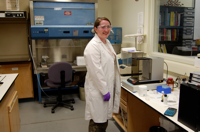
University:
Major:
Mentor(s):
Faculty Sponsor(s):
Faculty Sponsor's Department:
Project Title:
Project Description:
While it might not appear so on the macroscale, on the nanoscale all surfaces are in fact rough. Roughness affects many properties of surfaces such as adhesion and friction. Thus as technology becomes smaller and smaller it is important to know how these rough nanosurfaces interact and affect the applications these materials are used for in everyday devices. With this in mind, we have devised a method to construct rough surfaces which is reproducible and gives a known surface roughness. While carrying out this method the polymer PDMS (polydimethylsiloxane) is poured onto an electrochemically-treated silicon wafer mould of known roughness and then thermally cross-linked. This hardened negative mould is then peeled away and placed on top of a UV curable polymer spin-coated on a glass disc. This UV curable polymer is then UV cured, under the PDMS mould, into a copy of the original silica wafer. The surface roughness of each of these moulds was examined using AFM (Atomic Force Microscopy) which showed that each had the same surface roughness within a reasonable margin. Therefore, the methods examined in this project provided optimum conditions for the reproduction of surfaces with a known surface roughness. The surfaces created can then be used in future Surface Force Apparatus studies. These studies will focus mainly on the role of nanometer roughness on the friction and adhesion of two rough polymer surfaces.
